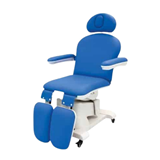An earlier study undertaken by the same team showed that rat pups subjected to anaesthesia in the first week of life had lasting difficulties remembering odors—and in some cases, the difficulties would worsen over time. Would human infants have a similar reaction?
The team, which included Dr. Greg Stratmann, who's devoted his research career to studying how infant anaesthesia may impair hippocampal function, set up the study with two groups of children—some who had undergone anaesthesia in infancy and some who had not.
The children who had undergone anaesthesia were aged six to 11, and they were age and gender matched with children in the control group who'd never experienced anaesthesia.
Over the course of 10 months, they were tested on their ability to remember specific drawings and the details they contained. And the results? The children who'd experienced anaesthesia as infants showed about a 28 percent reduction in their ability to recollect, compared with their peers.
Additionally, they scored 20 percent lower in assessment tests measuring how much detail they could remember from the drawings.
It's important to note that the children who'd experienced anaesthesia as babies did not differ from the control on tests measuring intelligence of behavior, "but those who had received anaesthesia had significantly lower recollection scores," according to a media summary provided by the journal Neuropsychopharmacology, which published the results.
Recollection plays a huge role in autobiographical memory, as well as the classroom-critical skills of reading comprehension and learning. What do these findings mean for children in the education system?
"Even subtle recollection deficits may have immediate consequences and reduce the child's potential to learn over time, which future studies should examine more closely," wrote the University of California team.
Interestingly, the team found no noticeable effects on familiarity for the children in the group. Familiarity deals more with providing the sense of an experience, while recollection is all about the details. Further, they found no difference between children who'd been anaesthetised once and children who'd gone under several times.
The study Stratmann and his team undertook with rats raises interesting questions about the long term. Further study is needed, but so far the data Stratmann has collected on rats "suggest that the deficit is lifelong."
"We've never seen the deficit go away in rats. In fact, we have seen it get worse over time," he told Agence France-Presse.
Will the same hold true for humans? What about the long-term effects of anaesthesia in older children and adults? How much can we infer from these rat studies?
Anaesthesia for infants is at times impossible to avoid—surgical procedures are a necessity for those born with heart defects or other abnormalities, for example. But for non-surgical procedures, such as scans and x-rays, is anaesthesia really necessary? Could it be, in fact, causing lasting harm to the minds of small children?
Stratmann warns against jumping to conclusions prematurely. This is, after all, merely one study. "However," he says, "these findings should get you thinking about whether an anesthetic that may previously have been considered harmless is really necessary."







